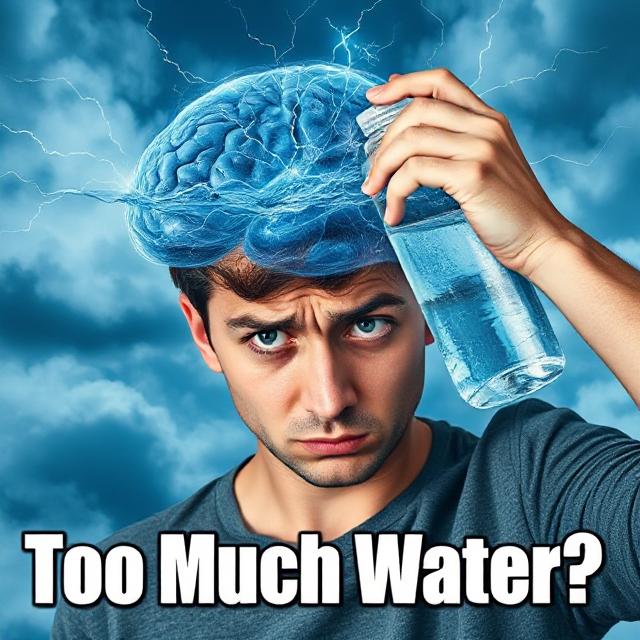
Table of Contents
Why Chugging Water Can Worsen Brain Fog
We’ve all heard the advice: “Drink more water.” But what if that well-meaning guidance is actually making your brain fog worse?
It sounds counterintuitive. After all, the brain is 75% water. Dehydration is known to impair focus, slow reaction time, and sap your mental sharpness. So why are so many people—especially health-conscious individuals—feeling more tired, groggy, and unfocused the more they hydrate?
The answer lies in a misunderstood balance between fluids and electrolytes. Chugging plain water without considering timing, context, or mineral content can dilute the very elements your brain depends on to fire properly.
This article unpacks the science behind chugging water and brain fog, revealing the hidden physiological costs of overhydration and offering smarter ways to stay mentally sharp through balanced hydration.
💧 Myth: More Water = More Energy
The hydration myth is built on a truth: dehydration harms cognitive function. Even mild fluid loss—around 1–2% of body weight—can reduce alertness, impair memory, and worsen mood.
But the solution isn’t simply drinking gallons of water. In fact, too much water without electrolytes can disrupt:
- Neuronal firing
- Blood-brain barrier function
- Glucose delivery to the brain
- Hormonal signaling from the kidneys
The result? Sluggish thought, lightheadedness, irritability, and—ironically—symptoms nearly identical to dehydration.
🧠 Your Brain Runs on Electrolytes, Not Just Water
The real key to hydration isn’t just water—it’s cellular hydration, which requires:
- Sodium, to maintain fluid balance and enable nerve transmission
- Potassium, for intracellular hydration and focus
- Magnesium, for ATP production and neuron calm
- Chloride, for acid-base and neurotransmitter regulation
Chugging water in large amounts can dilute blood sodium levels, causing mild hyponatremia. This leads to:
- Brain swelling
- Confusion
- Headache
- Reduced synaptic signaling
In other words, drinking more water can paradoxically dehydrate your cells by flushing out essential electrolytes.
⚖️ Water Intoxication: Rare but Real
Extreme cases of overhydration can lead to water intoxication—a condition where sodium is diluted so dangerously low that it causes seizures or coma. But you don’t need to hit that extreme to suffer cognitive decline.
Even chronic low-grade hyponatremia can mimic:
- ADHD-like symptoms
- Chronic fatigue
- Slow reaction time
- Poor word recall
If you’ve ever chugged water before a workout or during a fast and suddenly felt weaker or foggier, this imbalance is likely to blame.
🚰 Common Signs You’re Over-Hydrating
If you’re drinking lots of water but feel:
- Bloated or lightheaded
- Tired mid-morning despite sleep
- Foggy after meals
- Always thirsty but never quenched
- Frequently urinating with clear urine
…you may be flushing essential brain-supporting minerals.
⏱️ Timing Matters: When Chugging Water Hurts
Your hydration needs change throughout the day. Key rules:
- Morning: Start with mineralized water, not plain. You’ve lost sodium overnight.
- Pre-meal: Avoid large water intake right before meals—this dilutes stomach acid and impairs digestion.
- During mental tasks: Sip mineral water, not plain. Cognitive work burns through electrolytes.
- Post-exercise: Don’t just rehydrate—re-mineralize.
Chugging water:
- Right after waking
- After sweating
- During a fast
…can all deplete key brain electrolytes without strategic replenishment.
🧂 Smarter Hydration for Mental Clarity
If you want hydration to enhance your brain, not dull it, use these strategies:
1. Salt Your Water—Strategically
Add a pinch of unrefined sea salt or use electrolyte drops to remineralize your water. This slows urination and restores conductivity across brain neurons.
2. Use Lemon + Minerals in the Morning
Mix 8–12 oz of water with:
- A pinch of salt
- A squeeze of lemon (potassium)
- Optional: trace mineral drops
This primes the brain for alertness and digestion.
3. Drink Based on Thirst, Not Fear
If you’re peeing clear every 30 minutes or drinking by the hour just in case, you’re likely overshooting. Learn your body’s rhythms.
4. Pair Fluids With Electrolyte-Rich Foods
Instead of plain water, try:
- Cucumber slices + water (natural sodium & potassium)
- Bone broth (hydration + amino acids)
- Coconut water + sea salt (balanced electrolytes)
5. Avoid Guzzling During Stress
Cortisol shifts kidney sodium regulation. Drinking water rapidly when stressed or overcaffeinated can further dilute electrolytes.
🧠 Final Insight: Hydrate the Brain, Not Just the Bladder
Real hydration means mineral-supported water intake, guided by intuition, activity level, and brain demands.
Your neurons don’t just need water.
They need the electro-conductive matrix that water and minerals create together.
So if you’re drinking more than ever but still feel mentally off, tired, or thirsty—it’s not in your head. It’s in your minerals.